- Home
- E. F. Benson
Lucia Rising Page 2
Lucia Rising Read online
Page 2
‘Lucia mia!’ he exclaimed. ‘Ben arrivata! So you walked from the station.’
‘Si, Pepino, mio caro,’ she said. ‘Sta bene?’
He kissed her, and relapsed into Shakespeare's tongue, for their Italian, though firm and perfect as far as it went, could not be considered as going far, and was useless for conversational purposes, unless they merely wanted to greet each other, or to know the time. But it was interesting to talk Italian, however little way it went.
‘Molto bene,’ said he, ‘and it's delightful to have you home again. And how was London?’ he asked, in the sort of tone in which he might have inquired after the health of a poor relation who was not likely to recover.
She smiled rather sadly.
‘Terrifically busy about nothing,’ she said. ‘All this fortnight I have scarcely had a moment to myself. Lunches, dinners, parties of all kinds: I could not go to half the gatherings I was bidden to. Dear South Kensington!’
‘Carissima, when London does manage to catch you, it is no wonder they all make the most of you,’ said he. ‘You mustn't blame them for that.’
‘No, dear, I don't. Everyone was tremendously kind and hospitable: they all did their best. If I blame anyone, I blame myself. But I think this Riseholme life with its finish and its exquisiteness spoils one for other places. London is like a railway-junction: it has no true life of its own. There is no delicacy, no appreciation of fine shades. Individualism has no existence there: everyone gabbles together, gabbles and gobbles. If there is a concert in a private house – you know my views about music, and the impossibility of hearing music at all, if you are stuck in the middle of a row of people – even then the moment it is over you are whisked away to supper. There is always a crowd; there is always food; you cannot be alone, and it is only in loneliness, as Goethe says, that perceptions put forth their flowers. No one in London has time to listen: they are all thinking about who is there and who isn't there, and what is the next thing. The exquisite present, as you put it in one of your poems, has no existence there: it is always the feverish future.’
‘Delicious phrase! I should have stolen that gem for my poor poem if you had discovered it before.’
She was too much used to this incense to do more than sniff it in unconsciously, and she went on with her tremendous indictment.
‘It isn't that I find fault with London for being so busy,’ she said with strict impartiality, ‘for if being busy was a crime, I am sure there are few of us here who would ’scape hanging. But take my life here, or yours for that matter – well, mine if you like. Often and often I am alone from breakfast till lunch-time, but in those hours I get through more that is worth doing than London gets through all day and night. I have an hour at my music, not looking about and wondering who my neighbours are, but learning, studying, drinking in divine melody. Then I have my letters to write, and you know what that means, and I still have time for an hour's reading, so that when you come to tell me lunch is ready, you will find that I have been wandering through Venetian churches, or sitting in that little dark room at Weimar, or was it Leipzig? How would those same hours have passed in London? Sitting perhaps for half an hour in the Park, with dearest Aggie pointing out to me with thrills of breathless excitement a woman who was in the divorce court, or a coronetted bankrupt. Then she would drag me off to some terrible private view full of the same people all staring and gabbling at each other, or looking at pictures that made poor me gasp and shudder. No, I am thankful to be back at my own sweet Riseholme again. I can work and think here.’
She looked round the panelled entrance-hall with a glow of warm content at being home again that quite eclipsed the mere physical heat produced by her walk from the station. Wherever her eyes fell, those sharp, dark eyes that resembled buttons covered with shiny American cloth, they saw nothing that jarred, as so much in London jarred. There were bright brass jugs on the window-sill, a bowl of pot-pourri on the black table in the centre, an oak settee by the open fireplace, a couple of Persian rugs on the polished floor. The room had its quaintnesses too, such as she had alluded to in her memorable essay read before the Riseholme Literary Society, called ‘Humour in Furniture’, and a brass milk-can served as a receptacle for sticks and umbrellas. Equally quaint was the dish of highly realistic stone fruit that stood beside the pot-pourri, and the furry Japanese spider in a silk web over the window. Such was the fearful verisimilitude of this that Lucia's new housemaid had once fled from her duties in the early morning, to seek the assistance of the gardener in killing it. The dish of stone fruit had scored a similar success, for once she had said to Georgie Pillson: ‘Ah, my gardener has sent in some early apples and pears – won't you take one home with you?’ It was not till the weight of the pear (he swiftly selected the largest) betrayed the joke that he had any notion that they were not real ones. But then Georgie had had his revenge, for waiting his opportunity he had inserted a real pear among those stony specimens, and again passing through with Lucia, he had picked it out, and with lips drawn back had snapped at it with all the force of his jaws. For the moment she had felt quite faint at the thought of his teeth crashing into fragments… These humorous touches were altered from time to time; the spider, for instance, might be taken down and replaced by a china canary in a Chippendale cage, and the selection of the entrance-hall for those whimsicalities was intentional, for guests found something to smile at, as they took off their cloaks and entered the drawing-room with a topic on their lips, something light, something amusing about what they had seen. For the gong similarly was sometimes substituted a set of bells that had once decked the collar of the leading horse in a waggoner's team somewhere in Flanders: in fact, when Lucia was at home there was often a new little quaintness for quite a sequence of days, and she had held out hopes to the Literary Society that perhaps some day, when she was not so rushed, she would jot down material for a sequel to her essay, or write another covering a rather larger field on ‘Gambits of Conversation derived from Furniture’.
On the table there was a pile of letters waiting for Mrs Lucas, for yesterday's posts had not been forwarded to her for fear of their missing her (London postmen were probably very careless and untrustworthy), and she gave a little cry of dismay as she saw them.
‘But I shall be very naughty,’ she said, ‘and not look at one of them till after lunch. Take them away, caro, and promise me to lock them up till then, and not give me them, however much I beg. Then I will get into the saddle again, such a dear saddle, too, and tackle them. I shall have a stroll in the garden till the bell rings. What is it that Nietzsche says about the necessity to Mediterranizer yourself every now and then? I must Riseholmer myself.’
Pepino remembered the quotation, which had occurred in a review of some work of that celebrated author, where Lucia had also seen it, and went back, with the force of contrast to aid him, to his prose-poem on ‘Loneliness’, while his wife went through the smoking-parlour into the garden, in order to soak herself once more in the cultured atmosphere. In this garden behind the house there was no attempt to construct a Shakespearian plot, for, as she so rightly observed, Shakespeare, who loved flowers so well, would wish her to enjoy every conceivable horticultural treasure. But furniture played a prominent part in the place, and there were statues and sundials and stone seats scattered about with almost too profuse a hand. Mottoes also were in great evidence, and while a sundial reminded you that Tempus fugit, an enticing resting-place somewhat bewilderingly bade you ‘Bide a wee’. But then, again, the rustic seat in the pleached alley of laburnums had carved on its back, ‘Much have I travelled in the realms of gold’, so that meditating on Keats, you could bide a wee with a clear conscience. Indeed, so copious was the wealth of familiar and stimulating quotations, that one of her subjects had once said that a stroll in Lucia's garden was not only to enjoy her lovely flowers, but to spend a simultaneous half-hour with the best authors.
There was a dovecote of course, but since the cats always killed the doves, Mrs Luca
s had put up round the desecrated home several pigeons of Copenhagen china, which were both immortal as regards cats and also carried on the suggestion of humour in furniture. The humour had attained the highest point of felicity when Pepino concealed a mechanical nightingale in a bush, which sang ‘Jug-jug’ in the most realistic manner when you pulled a string. Georgie had not yet seen the Copenhagen pigeons, and, being rather short-sighted, thought they were real. Then, oh, then, Pepino pulled the string, and for quite a long time Georgie listened entranced to their melodious cooings. That served him out for his ‘trap’ about the real pear introduced among the stone specimens. For in spite of the rarefied atmosphere of culture at Riseholme, Riseholme knew how to desipere in loco, and its strenuous culture was often refreshed by these light refined touches.
Mrs Lucas walked quickly and decisively up and down the paths as she waited for the summons to lunch; the activity of her mind reacted on her body, making her brisk in movement. On each side of her forehead were hard, neat undulations of black hair, that concealed the tops of her ears. She had laid aside her London hat, and carried a red cotton Contadina's umbrella, which threw a rosy glow on the oval of her thin face, with its colourless complexion. She bore the weight of her forty years extremely lightly, and but for the droop of skin at the corners of her tight and compressed mouth, she might have passed as a much younger woman. Her face was otherwise unlined, and bore no traces of the ravages of emotional living, which both ages and softens. Certainly there was nothing soft about her, and very little of the signs of age, and it would have been reasonable to conjecture that twenty years later she would look but little older than she did to-day. Such emotions as she was victim of were the sterile and ageless ecstasies of art; such desires as beset her were not connected with her affections, but her ambitions. Dynasty she had none, for she was childless, and thus her ambitions were limited to the permanence and security of her own throne as Queen of Riseholme. She really asked nothing more of life than the continuance of such harvests as she had so plenteously reaped for those last ten years. As long as she directed the life of Riseholme, took the lead in its culture and entertainment, was the undisputed fountain-head of all its inspirations, and from time to time refreshed her memory as to the utter inferiority of London, she wanted nothing more. But to secure that she dedicated all that she had of ease, leisure and income. Being practically indefatigable, the loss of ease and leisure troubled her but little, and being in extremely comfortable circumstances, the question of money did not trouble her. She might easily look forward to enjoying an unchanging, middle-aged activity, while generations of youth withered round her, and no star, remotely rising, had as yet threatened to dim her unrivalled effulgence. Though essentially autocratic, her subjects were allowed and even encouraged to develop their own minds on their own lines, provided always that those lines met at the junction where she was station-master. With regard to religion, finally, it may be briefly said that she believed in God in much the same way as she believed in Australia, for she had no doubts whatever as to the existence of either, and she went to church on Sunday in much the same spirit as she would look at a kangaroo in the Zoological Gardens, for kangaroos came from Australia.
A low wall separated the far end of her garden from the meadow outside; beyond that lay the stream which flowed into the Avon, and it often seemed wonderful to her that the water which wimpled by would (unless a cow happened to drink it) soon be stealing along past the church at Stratford where Shakespeare lay. Pepino had written a very moving little prose-poem about it, for she had royally presented him with the idea, and had suggested a beautiful analogy between the earthly dew that refreshed the flowers, and was drawn up by the fire of the sun, and Thought, the spiritual dew, that refreshed the mind, and thereafter, rather vaguely, was drawn up into the Full-orbed Soul of the World…
At that moment her eye was attracted by an apparition on the road which lay adjacent to the further side of the happy stream which flowed into the Avon. There was no mistaking the identity of the stout figure of Mrs Quantock, with its short steps and its gesticulations, but why, in the name of wonder, should that Christian Scientist be walking with the draped and turbaned figure of a man with a tropical complexion and a black beard? His robe of saffron-yellow, with a violently green girdle, was hitched up for ease in walking, and unless he had chocolate-coloured stockings on, Mrs Lucas saw human legs of the same shade. Next moment that debatable point was set at rest, for she caught sight of short pink socks in red slippers… Even as she looked, Mrs Quantock saw her (for owing to Christian Science she had recaptured the quick vision of youth), and waggled her hand and kissed it, and evidently called her companion's attention, for next moment he was salaaming to her in some stately Oriental manner. There was nothing to be done for the moment except to return these salutations, as she could not yell an aside to Mrs Quantock, screaming out ‘Who is that Indian?’ for if Mrs Quantock heard, that Indian would hear too; but as soon as she could she turned back towards the house again, and when once the lilac-bushes were between her and the road she walked with more than her usual speed, in order to learn with the shortest possible delay from Pepino who this fresh subject of hers could be. She knew there were some Indian princes in London: perhaps it was one of them, in which case it would be necessary to read up Benares or Delhi in the Encyclopaedia without loss of time.
2
As she traversed the smoking-parlour the cheerful sounds that had once tinkled from the collar of a Flemish horse chimed through the house, and simultaneously she became aware that there would be macaroni au gratin for lunch, which was very dear and remembering of Pepino. But before setting fork to her piled-up plate, she had to question him, for her mental craving for information was far keener than her appetite for food.
‘Caro, who is an Indian,’ she asked, ‘whom I saw just now with Daisy Quantock? They were walking on the other side of il piccolo Avono.’
Pepino had already begun his macaroni and must pause to shovel the outlying strings of it into his mouth. But the haste with which he did so was sufficient guarantee of his eagerness to reply as soon as it was humanly possible to do so.
‘Indian, my dear?’ he asked with the greatest interest.
‘Yes; turban and burnous and calves and slippers,’ she said rather impatiently, for what was the good of Pepino having remained in Riseholme, if he could not give her precise and certain information on local news when she returned? His prose-poems were all very well, but as prince-consort he had other duties of state which must not be neglected for the calls of Art.
This slight asperity on her part seemed to sharpen his wits.
‘Really, I don't know for certain, Lucia,’ he said, ‘for I have not set eyes on him. But putting two and two together, I might make a guess.’
‘Two and two make four,’ she said, with that irony for which she was feared and famous. ‘Now for your guess. I hope it is equally accurate.’
‘Well, as I told you in one of my letters,’ said he, ‘Mrs Quantock showed signs of being a little off with Christian Science. She had a cold, and though she recited the “True Statement of Being” just as frequently as before, her cold got no better. But when I saw her on Tuesday last, unless it was Wednesday – no, it couldn't have been Wednesday, so it must have been Tuesday –’
‘Whenever it was then,’ interrupted his wife, brilliantly summing up his indecision.
‘Yes, whenever it was, as you say, on that occasion, Mrs Quantock was very full of some Indian philosophy which made you quite well at once. What did she call it, now? Yoga! Yes, that was it!’
‘And then?’ asked Lucia.
‘Well, it appears you must have a teacher in Yoga, or else you may injure yourself. You have to breathe deeply and say “Om” –’
‘Say what?’
“‘Om.” I understand the ejaculation to be “Om”. And there are very curious physical exercises: you have to hold your ear with one hand and your toes with the other, and you may strain yours
elf unless you do it properly. That was the general gist of it.’
‘And shall we come to the Indian soon?’ said Lucia.
‘Carissima, you have come to him already. I suggest that Mrs Quantock has applied for a teacher and got him. Ecco!’
Mrs Lucas wore a heavily corrugated forehead at this news. Pepino had a wonderful flair in explaining unusual circumstances in the life of Riseholme, and his conjectures were generally correct. But if he was right in this instance, it struck Lucia as being a very irregular thing that anyone should have imported a mystical Indian into Riseholme without consulting her. It is true that she had been away, but still there was the medium of the post.
‘Ecco, indeed!’ she said. ‘It puts me in rather a difficult position, for I must send out the invitations to my garden-party to-day, and I really don't know whether I ought to be officially aware of this man's existence or not. I can't write to Daisy Quantock and say “Pray bring your black friend Om,” or whatever his name proves to be, and on the other hand, if he is the sort of person whom one would be sorry to miss, I should not like to have passed over him.’
‘After all, my dear, you have only been back in Riseholme half an hour,’ said her husband. ‘It would have been difficult for Mrs Quantock to have told you yet.’
Her face cleared.
‘Perhaps Daisy has written to me about him,’ she said. ‘I may find a full account of it all when I open my letters.’

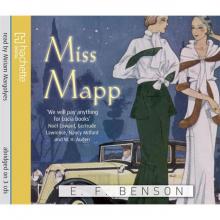 Miss Mapp
Miss Mapp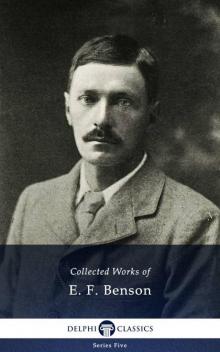 Works of E F Benson
Works of E F Benson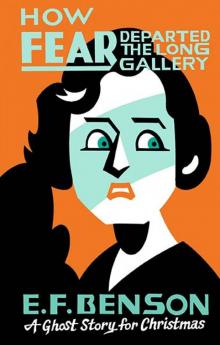 How Fear Departed the Long Gallery
How Fear Departed the Long Gallery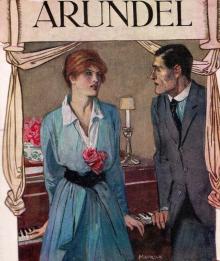 Dodo's Daughter: A Sequel to Dodo
Dodo's Daughter: A Sequel to Dodo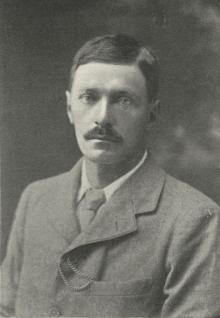 The House of Defence v. 1
The House of Defence v. 1 Queen Lucia
Queen Lucia Night Terrors
Night Terrors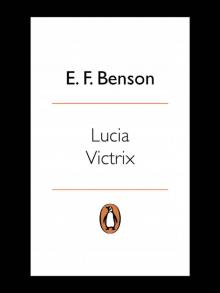 Lucia Victrix
Lucia Victrix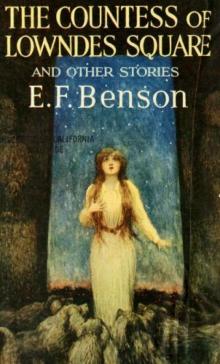 The Countess of Lowndes Square and Other Stories
The Countess of Lowndes Square and Other Stories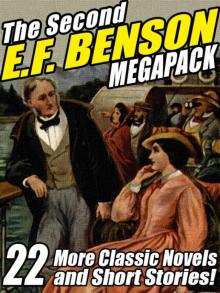 The Second E. F. Benson Megapack
The Second E. F. Benson Megapack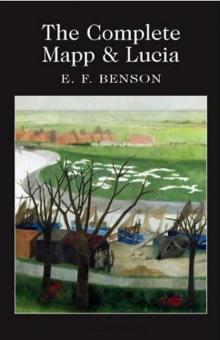 The Complete Mapp & Lucia
The Complete Mapp & Lucia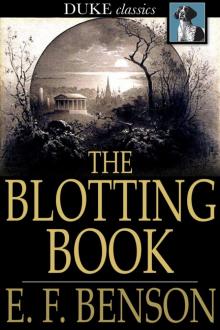 The Blotting Book
The Blotting Book The E. F. Benson Megapack
The E. F. Benson Megapack Lucia Rising
Lucia Rising Ghost Stories
Ghost Stories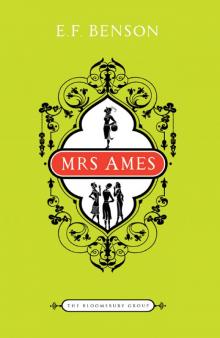 Mrs. Ames
Mrs. Ames E. F. Benson
E. F. Benson